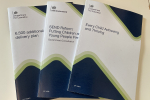Damian released the following statement today:
- MP sees great potential for Generative AI to support teachers with tailored learning resources, easing workloads
- But warns of wider risks and dangers
- And calls for exams – for most pupils in most subjects – to remain handwritten in exam conditions, indefinitely
Damian Hinds, MP for East Hampshire, led a debate in Westminster Hall on the use of Generative Artificial Intelligence (AI) in schools, its opportunities, and its potential impact on children’s cognitive development.
A recent teacher survey showed half were already using AI in their professional duties, such as for lesson planning and making learning resources. Damian called on the government to make it easy to access high quality products and sources, and said this could make a material difference to the amount of time teachers have to spend on lesson prep.
But he also highlighted a number of risks with the technology noting “whatever pace Whitehall works at, kids will work at about six times that pace.”
It is important, the MP said, that children know about the limitations of AI – that it can be prone to “hallucination” and giving dud information, and have inbuilt biases. In a world where there is already much blurring of facts, fiction and opinions; all manner of ‘news sources’ and influencers; virtual reality and the metaverse; it is vital that pupils are taught to be discerning and seek out trustworthy primary sources.
The most immediate concerns, Damian said, are around homework, assessment and exams: the surest way to guarantee security and integrity of exams is for them to be hand-written and done in traditional exam conditions. There is a move by some exam boards to move to digital exams. Damian urged the minister not to allow this – except for subjects like Computer Science or, of course, where a pupil should use a keyboard because of a special educational need or disability.
Moreover, the MP said, if GCSEs were online, next mocks would become online and there would be a ‘cascade effect’ down the year groups, to the point where people might question the need for handwriting at all. He noted that there are important developmental and learning benefits from handwriting and it is a skill we must not lose.
Overall, he said, AI has transformative potential in education, but its adoption must be carefully managed – we should proceed with great caution. He called for a Code of Practice, and more training and guidance for teachers to get the most from the technology.
The full debate can be accessed here: Parliamentlive.tv - Westminster Hall


